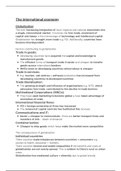Summary
Summary The international economy
These notes provided a detailed insight into the topic of The international economy. This is perfect for an AQA Economics A Level student. This file breaks down the content in order for it to be fully absorbed. It finds the perfect balance between bullet points, images, graphs and in depth paragrap...
[Show more]




